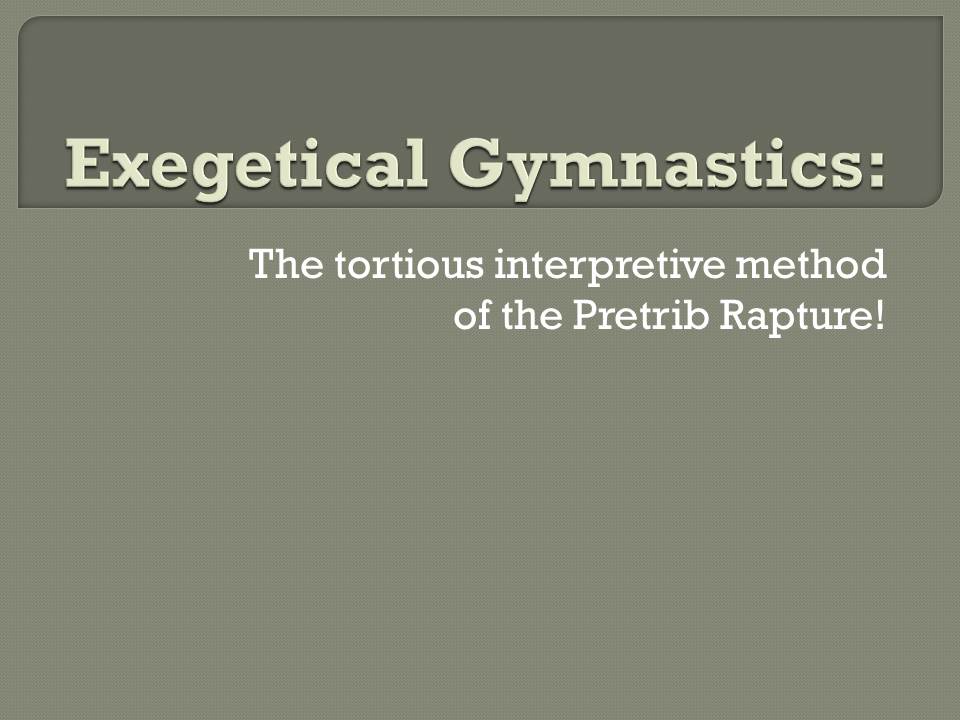Listen as Charles Cooper shows why pretribulationism is so debated. It invites debate because of its practice of wrongfully interpreting Scripture seemingly intentionally. Follow the Link!
Biblical Studies
The “Terminus A Quo” of The Day of the Lord: The Deciding Argument forPretribulationism — By: Jerry M. Hullinger, JMAT 19:2 (Fall 2015)
After twenty years of study concerning the eschatological return of Jesus Christ for the joyous aerial reunion with his entire bride, we continue to marvel at the now thoroughly discredited defense of the view known as pretribulationism. It has changed very little despite the beating up it has received. As advocates of the PreWrath view, we remain on the lookout for anyone who seeks to present a compelling case for a pretribulational rapture. If PreWrath is not thought to be biblical, we want to be shown “why not?”
The Rapture in Matthew 24
The Rapture in Matthew 24
A defense of the PreWrath rapture position stands or falls with the conclusion that Matthew 24 deals with this important event. At the heart of the PreWrath position is the insistence that Matthew 24 does not speak of any details regarding the wrath of God. That is to say, this chapter does not speak of even one specific expression of God’s eschatological wrath. There is no discussion of what will happen to the non-elect wicked in Matthew 24. Verse 51 describes the fate of servants who will experience the master’s displeasure when he comes. The PreWrath position argues that the wrath of God is not present in Matthew 24, but that the rapture is found there.
Jerusalem’s Destruction
Jerusalem’s Destruction
Matthew 24:2 and Daniel 9:26
In the Olivet Discourse recorded in Matthew’s gospel, the Lord Jesus predicts, “There will not be left here one stone upon another that will not be thrown down.” Similarly, Daniel 9:26 states, “And after the sixty-two weeks, an anointed one shall be cut off and shall have nothing. And the people of the prince who is to come shall destroy the city and the sanctuary. Its end shall come with a flood, and to the end there shall be war. Desolations are decreed (ESV).
It is our conviction that the prediction by our Lord in Matthew 24:2 and the prediction in Daniel 9:26 refer to the same fulfillment: the destruction of the second temple by the Romans. The lack of clarity concerning this detail has been hampered by the failure of translators to correctly render Daniel 9:26 and by the failure of commentators to correctly understand the author’s intent. We hope to correct this misunderstanding.
We could better understand 9:26, if the translation would indicate which antecedents go with each pronoun. Notice, “And after the sixty-two weeks, an anointed one (the sanctuary) will suffer destruction and there will be nothing left of it. For the people of the prince who is to come shall destroy completely the city (feminine) and the sanctuary (masculine). Its (the sanctuary’s) end shall come with a flood and to the end of (it=sanctuary) there shall be war.”
Our translation better reflects the sense intended by Daniel. It also accords with the prophetic statement of our Lord in Matthew 24:2. The Romans did destroy Jerusalem and their destruction of the sanctuary was complete. Daniel 9:26 and Matthew 23:38 promise “desolation.” It is our hope and prayer that Jerusalem’s desolation will soon end. Come Lord Jesus, come!
